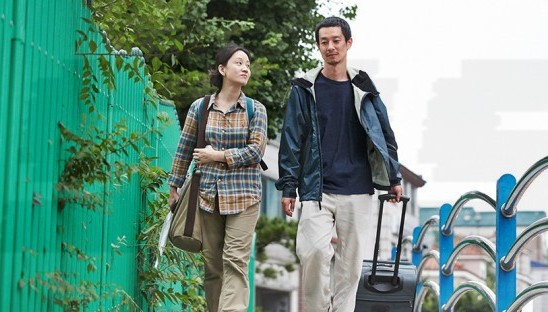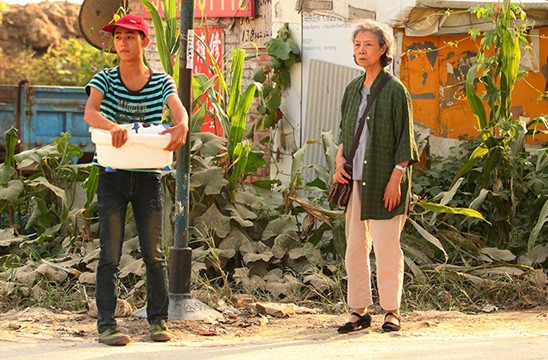So, 31 films in and the latter half of the Venice Film Festival is proving more meaty with some very interesting titles from around the planet. Here are a few of my highlights.
Shinya Tsukamoto’s Japanese war film, Nobi (Fires on the Plain), which he is at pains to say is not a remake of Kon Ichikawa’s 1959 classic, but instead a return to the novel source material, is a powerful, rage-filled beast – in which Tsukamoto himself stars as an inexperienced private fighting in the living hell of the Pacific at the tail end of WWII.

It’s a phantasmagoric grotesquery, with a tone hovering in a liminal space between life and death. As the starving and lost private tries to make it across the jungle to his forces evacuation point, he must avoid the victorious American marines and local militia. Along the way he attempts to hold on to what is left of his humanity while cannibalism and savagery threaten to psychologically overwhelm him. Its a potent, extremely bloody, completely immersive experience which gives new meaning to the worn adage war is hell. One for the strongest stomachs which has a slim, but possible, chance at a UK theatrical release thanks to Tsukamoto’s status as director of the Tetsuo films.
In quiet counter-point to Tuskamoto’s film, but one suspects made with equal passion, comes Roy Andersson’s (Songs from the Second Floor, You, The Living) A Pigeon Sat on a Branch Reflecting on Existence. A series of the directors trademark laconic, tender and wry tableaux, this does pretty much what the title suggests (minus the pigeon). A pair of down-at-heel travelling salesmen, peddling tired novelty jokes, search, Godot-like, for a shop called Party which appears to have vanished. Along the way they experience all manner of capitalist and consumer heartache. Yet the film never becomes a simplistic polemic and is more interested in the absurdity of big business and the everyman’s place within the system. It’s a truly unique vision which won’t expand his audience, but will greatly please friendly critics and fans alike.

Hong Sangsoo’s (Ha Ha Ha, Our Sunhi) latest, Hill of Freedom, see’s us in familiarly wry territory from the South Korean auteur. His sixteenth film follows a young Japanese mans search in Korea for a woman he had hoped to marry several years earlier. She has been away and just received a series of letters he sent to her when they drop to the floor, mixing up the order of the letters as she reads them. So Hong plays with the time structure of the film, a preoccupation from a number of his earlier films, examining how time organise’s our perception of events and of people in mysterious ways. It will no doubt struggle to find distribution but for fans of Hong’s work (like me!) it is something to seek out.
Michael Almereyda’s (Nadja) Cymbeline follows his previous contemporising of Shakespeare’s Hamlet with similar results. It boasts a starry(ish) cast including Ethan Hawke (ubiquitous at the Venice festival with several films to promote), Ed Harris, Milla Jovovich and John Leguizamo, and pitches a biker gang (the Briton’s) against the police force (the Roman’s), in a manner that owes something of a debt to both Kenneth Anger and Baz Lurhmann. Purists hated this take on Shakespeare but if you can go with it, it has a certain low-rent cheesy cult charm. I suspect given the cast it’ll find its way to UK cinemas where it will need a fair wind and kind critics to make its mark.

Chinese auteur Wang Xiaoshuai’s (The Days, Beijing Bicycle) latest, Red Amnesia, is one of the strongest films at Venice this year. It owes a good deal to Haneke’s Hidden but is equally its own creation. An elderly grandmother finds herself harassed by a mystery phone caller, which may be the result of one of her yuppie sons construction deals going wrong. Yet she thinks it may have something to do with her denouncing a neighbour to the communist party many years earlier. As the harassment steps up, and we are in real fear of violence, the films exposes the New China’s capitalism and its cost to the older generations, as family values disintegrate in a gold rush. Yet it’s never quite so simple, and the film also captures a complex emotional register between dream and reality, not to mention subtly engaging with queer politics and cultural guilt. It was a riveting two hours which I really hope wins something and gets picked up for UK distribution where it ranks alongside the work of Jia Zhangke in its multi-layered portrait of contemporary Chinese life.
Seeing Abel Ferrara’s (Driller Killer, Welcome to New York) Pasolini here in Venice was a treat. Perhaps Ferrara’s most accomplished work since King of New York, this controlled (which can’t always be said of Ferrara!) take on the last 24 hours in Pier Paolo Pasolini’s life is riveting cinema. Willem Dafoe is terrific at capturing the intellectual, political and psycho-sexual complexities of one of the greatest Italian artists of the 20th century. The films mixes Pasolini’s work as a filmmaker and literary intellectual with his queer sexuality and political transgression (which most people believe is why he died) and posits that Pasolini’s murder was a direct result of his gay cruising.

Into this heady mix Ferrara powerfully weaves his own rendition of Pasolini’s last unfinished film project, about two men on a sexual odyssey into a queer utopia, in an imagined Italy, which goes beyond this world and into limbo in the next. While Ferrara and Pasolini are both perhaps acquired tastes for mainstream audiences, this film magnificently manages to please both fanbase’s in a relatively accessible manner which is no mean feat. It’s hard to imagine this film won’t be wending its way to UK cinemas early next year.

